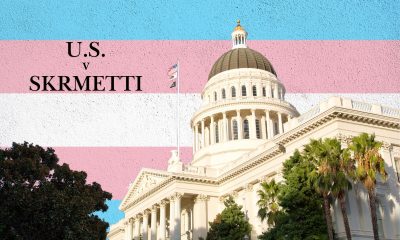Indiana
Indiana lawmakers override the veto of the bill banning trans girls in sports
This law makes Indiana the 8th state to ban trans youth from playing sports in 2022 by legislative action — and the 16th in the country

INDIANAPOLIS – The Indiana Legislature voted Tuesday to overturn Republican Governor Eric Holcomb’s March veto of HB 1041, a measure that bans transgender girls from competing on girls’ K-12 sports teams in the state.
The vote to override the veto means that this law makes Indiana the 8th state to ban trans youth from playing sports in 2022 by legislative action — and the 16th in the country.
“Governor Holcomb was the second governor this year to uphold the dignity of transgender and nonbinary youth, and veto an attempt by lawmakers to write them out of existence. While those young people continue to face unrelenting political attacks, the Indiana legislature voted to override his act of courage and compassion, pushing these marginalized youth even further to the sidelines,” said Sam Ames, Director of Advocacy and Government Affairs at The Trevor Project.
“This bill claimed to solve a problem of ‘fairness’ in school sports in Indiana that didn’t exist, but its negative impacts on the mental health and well-being of trans and nonbinary youth — young people who already face disproportionate rates of bullying, depression, and suicide — are very real. To the young people in Indiana watching tonight: you are stronger than they know. We are here for you, we will fight for you, and we are not going anywhere.”
In his veto message sent to House Speaker Todd Huston’s office, Holcomb said the bill presumed a problem already existed that required the state to intervene and it implied the goals of consistency and fairness in girls’ sports were not being met.
“After thorough review, I find no evidence to support either claim even if I support the overall goal,” Holcomb wrote.
The Trevor Project’s 2022 National Survey on LGBTQ Youth Mental Health found that more than half (53%) of transgender and nonbinary youth seriously considered suicide in the past year, and nearly 1 in 5 attempted suicide. 71% of transgender and nonbinary youth reported that they have experienced discrimination based on their gender identity, and those who have reported significantly higher rates of attempting suicide in the past year compared to those who have not. Further, 83% of transgender and nonbinary youth said that they have worried about transgender people being denied the ability to play sports due to state or local laws.
Indiana
‘You will lose access’: Pornhub says as age verification takes effect
Pornhub — joined by other explicit content providers and a free speech group — sued the state in an attempt to block the law
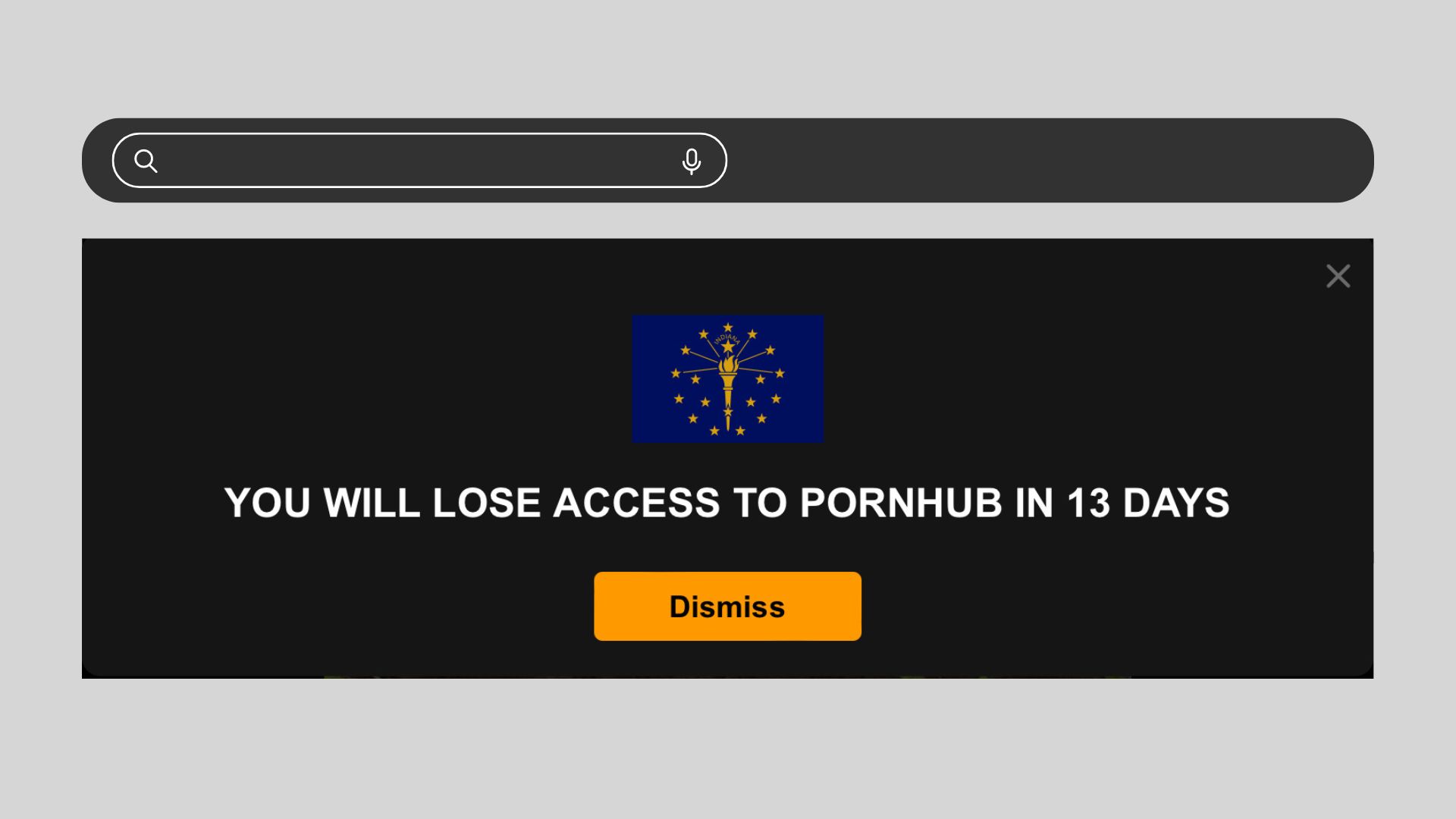
By Leslie Bonilla Muñiz | MONTREAL, Canada – Pornography video-sharing website Pornhub says it’ll block access to Hoosier users as Indiana prepares to enact a recently approved age verification requirement. Its exit is planned for June 27.
And it’s warning users directly.
“You will lose access to Pornhub in 13 days,” a website pop-up read Thursday.
“Did you know that your government wants you to give your driver’s license before you can access Pornhub?” it continued. “As crazy as that sounds, it’s true.”
It comes days after Pornhub — joined by other explicit content providers and a free speech group — sued the state in an attempt to block the law.
Pornhub parent company Aylo said it has publicly supported age verification for “years” but added, “the way many jurisdictions worldwide have chosen to implement age verification is ineffective, haphazard, and dangerous.”
Senate Bill 17 requires that “adult-oriented websites” hosting explicit materials — such as pornography or other “material harmful to minors” — verify a user’s identity before allowing access. That could be by scanning a driver’s license or registering with a third-party verification service.

Lawmakers tussled over the legislation in committee and on the floor. Despite that, they overwhelmingly voted to pass the law, according to the Legislature’s bill action tracker.
“We have children who have seen hardcore content before they have their first kiss,” bill author Sen. Mike Bohacek, R-Michiana Shores, said in January.
Senate Minority Leader Greg Taylor, D-Indianapolis — the bill’s most outspoken opponent — held that the legislation lacked information privacy “guardrails.” He raised concerns about how securely the proof of age documents will be handled.
That’s an argument Pornhub is making directly to its users.
In its pop-up, Pornhub said it doesn’t want minors accessing its website, but that “putting everybody’s privacy at risk won’t achieve that.”
Rather than attempt to verify Hoosier users’ ages, Pornhub plans to close up shop in Indiana.
Parent company Aylo said Pornhub was “one of the few sites” to comply with Louisiana’s age verification law when it took effect in early 2023.
“Since then, our traffic in Louisiana dropped approximately 80%. These people did not stop looking for porn,” Aylo said. “They just migrated to darker corners of the internet that don’t ask users to verify age, that don’t follow the law, that don’t take user safety seriously, and that often don’t even moderate content.”
“In practice, the laws have just made the internet more dangerous for adults and children,” Aylo continued.
The company has instead advocated for “device-based” age verification, and said it was “happy to collaborate” with government, technology companies and other partners to work on a “solution.”
Critics have said the approach, which uses a device’s built-in features to verify a user’s age, doesn’t protect children who use a parent’s phone or other device. Aylo also suggested people use existing parental control features.
“The safety of our users is our number one concern,” Aylo concluded. “We will always comply with the law, but we hope that governments around the world will implement laws that actually protect the safety and security of users.”
Indiana’s law goes into effect July 1 — unless a judge blocks it.
Pornhub and the other plaintiffs filed suit on Monday, alleging that the law is unconstitutional — violating the First Amendment — and unenforceable. They asked a federal judge in Indianapolis to issue a preliminary injunction against the law.
Indiana Attorney General Todd Rokita defended it Tuesday as a “commonsense” way to protect children.
******************************************************************************************

Leslie covers state government for the Indiana Capital Chronicle with emphases on elections, infrastructure and transportation. She previously covered city-county government for the Indianapolis Business Journal. She has also reported on local, national and international news for the Chicago Tribune, Voice of America and more. She holds an undergraduate degree in journalism from Northwestern University.
******************************************************************************************
The preceding article was previously published by the Indiana Capital Chronicle and is republished with permission.
The Indiana Capital Chronicle is an independent, nonprofit news organization dedicated to giving Hoosiers a comprehensive look inside state government, policy and elections. The site combines daily coverage with in-depth scrutiny, political awareness and insightful commentary.
We’re part of States Newsroom, the nation’s largest state-focused nonprofit news organization.
Indiana
Indiana Attorney General Todd Rokita wades into pronoun battle
Indiana’s Civil Rights Act doesn’t include sexual orientation or gender identity as protected classes, the attorney general’s office said
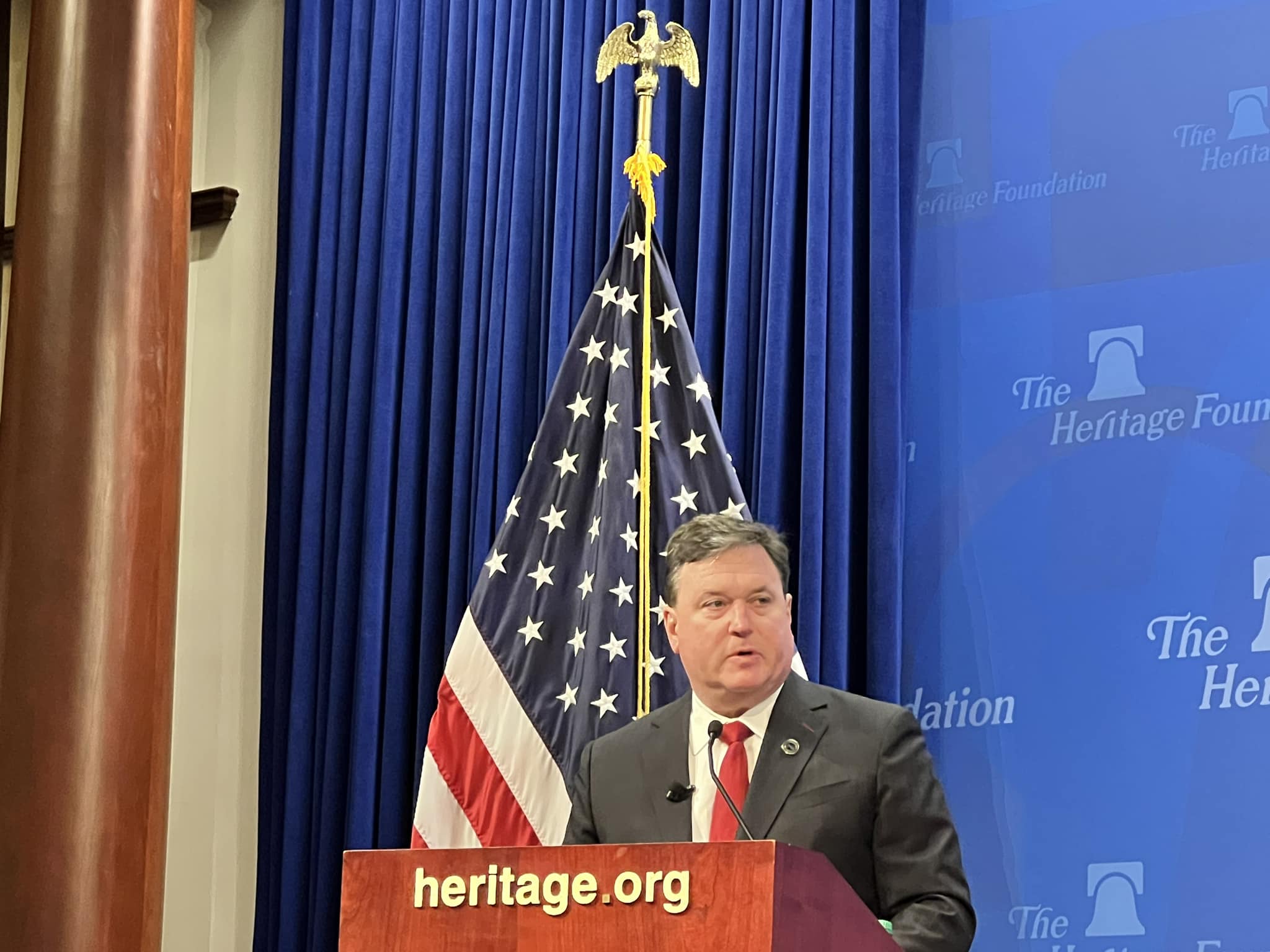
By Whitney Downard | INDIANAPOLIS, Ind. – In a politically charged and, at times, inflammatory Facebook event, Indiana Attorney General Todd Rokita waded into a recent discussion on pronouns in the workplace.
Earlier this week, the U.S. Equal Employment Opportunity Commission ruled that repeatedly misgendering an employee or denying them access to a bathroom consistent with their gender identity amounts to workplace harassment.
Rokita issued a ruling of his own Wednesday, saying that “neither state nor federal law requires a coworker to use the preferred pronouns and names of fellow employees.”
But the office cautioned businesses that even if misgendering someone isn’t a recognized form of discrimination, they could still amount to a “hostile work environment claim.”
“There are no examples in case law where the (mis)use of an employee’s pronouns alone has been held to have created a hostile work environment pursuant to Title VII. However, many of these cases at least imply that repeated use of non-preferred pronouns and names could result in such an outcome, if the conduct is ‘severe or pervasive enough,’” the ruling said.
In the 20-minute Facebook live event, the latest in a series of videos from the office, Rokita denounced the move as part of “a new push by America haters to force the rest of us to embrace the radical gender ideology that they want.”
Rokita went on to describe the participation of transwomen in sports as “an invasion” and called ongoing support for gender diversity “trans-sanity.”
“Most Hoosiers agree that we all should extend love and compassion toward individuals dealing with gender dysphoria. After all, it is a problem. And it should be treated. But it doesn’t need to be affirmed, nor should it,” Rokita said. “Treating these individuals with respect, however, does not require us by law to deny basic truths like the fact that there are only two sexes and an individual is one of them.”
Hundreds of thousands of Americans are intersex, a recognized third sex among scientists. Indiana’s Civil Rights Act doesn’t include sexual orientation or gender identity as protected classes, the attorney general’s office said.
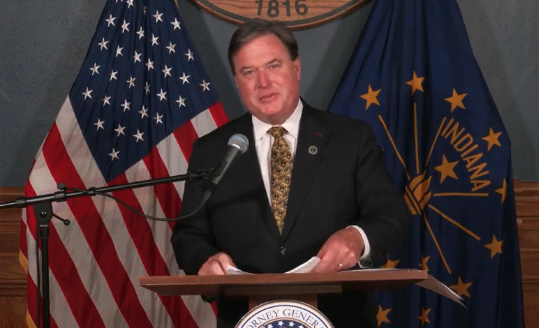
(Screenshot from Facebook Live event)
Rokita said the opinion came from a question submitted by Indiana Rep. Mike Speedy, who is running in the 6th Congressional District GOP primary.
“I don’t believe this opinion, in any way, infringes on anyone’s right to be who they think they are. What it does is it protects employers and employees from that ideology from being imposed upon them in a workplace environment. And that’s fair to everyone,” Speedy said.
Rokita said the announcement wasn’t intended to be political, though it comes on the eve of the primary. He said Speedy’s request came in months ago but it took time to compile the ruling.
The Indiana Democratic Party accused Rokita of using taxpayer dollars for political purposes.
“Rokita owes Hoosiers an apology for this obvious political stunt. Whether it’s attacking medical professionals like Dr. Caitlin Bernard or using his office for political games, Rokita’s tenure has been an embarrassment to Indiana. Hoosiers can replace him with a Democratic Attorney General who will respect women’s rights, and focus on protecting taxpayers,” the party said in a statement.
Rokita will likely be on the ballot in November. Party nominees for attorney general are selected through a convention process in Indiana.
******************************************************************************************

A native of upstate New York, Whitney previously covered statehouse politics for CNHI’s nine Indiana papers, focusing on long-term healthcare facilities and local government. Prior to her foray into Indiana politics, she worked as a general assignment reporter for The Meridian Star in Meridian, Mississippi. Whitney is a graduate of St. Bonaventure University (#GoBonnies!), a community theater enthusiast and cat mom.
******************************************************************************************
The preceding article was previously published by the Indiana Capital Chronicle and is republished with permission.
The Indiana Capital Chronicle is an independent, nonprofit news organization dedicated to giving Hoosiers a comprehensive look inside state government, policy and elections. The site combines daily coverage with in-depth scrutiny, political awareness and insightful commentary.
We’re part of States Newsroom, the nation’s largest state-focused nonprofit news organization.
Indiana
Drag queen announces bid for mayor’s job in Fort Wayne, Indiana
The late Mayor Tom Henry was diagnosed with late-stage stomach cancer & experienced an emergency hospitalization, he died shortly after

FORT WAYNE, Ind. – In a Facebook post Tuesday, a local drag personality announced he was running for the office of mayor once held by the late Fort Wayne Mayor Tom Henry, who died last month just a few months into his fifth term.
Henry was recently diagnosed with late-stage stomach cancer and experienced an emergency that landed him in hospice care. He died shortly after.
ABC, NBC, and MyNetworkTV affiliate WPTA 21 reported that Fort Wayne resident Branden Blaettne, whose drag name is Della Licious, confirmed he filed paperwork to be one of the candidates seeking to finish out the fifth term of the late mayor.
Blaettner, who is a community organizer, told WPTA 21 he doesn’t want to “get Fort Wayne back on track,” but rather keep the momentum started by Henry going while giving a platform to the disenfranchised groups in the community. Blaettner said he doesn’t think his local fame as a drag queen will hold him back.
“It’s easy to have a platform when you wear platform heels,” Blaettner told WPTA 21. “The status quo has left a lot of people out in the cold – both figuratively and literally,” Blaettner added.

The Indiana Capital Chronicle reported that Rep. Phil GiaQuinta, who has led the Indiana House Democratic caucus since 2018, has added his name to a growing list of Fort Wayne politicos who want to be the city’s next mayor. A caucus of precinct committee persons will choose the new mayor.
According to the Fort Wayne Journal Gazette, the deadline for residents to file candidacy is at 10:30 a.m. April 17. A town hall with the candidates is scheduled for 6 p.m. April 18 at Franklin School Park. The caucus is set for 10:30 a.m. April 20 at the Lincoln Financial Event Center at Parkview Field.
At least six candidates so far have announced they will run in the caucus. They include Branden Blaettne, GiaQuinta, City Councilwoman Michelle Chambers, City Councilwoman Sharon Tucker, former city- and county-council candidate Palermo Galindo and 2023 Democratic primary mayoral candidate Jorge Fernandez.
Indiana
Indiana launches anti-LGBTQ “snitch line,” its flooded with protests
AG Todd Rokita launched a tool for parents to report “gender ideology” in schools. Users immediately began sending memes in protest

By Erin Reed | INDIANAPOLIS, Ind. – On Monday evening, Attorney General Todd Rokita launched a form for reporting schools that teach about LGBTQ+ issues, socio-emotional learning, Black history, or topics deemed to be “political ideology” in schools.
In making the announcement on the Tony Kinnett show, livestreamed on YouTube, Rokita stated that investigators would pore over submissions and post any they believed to be credible onto a publicly viewable database.
Upon launching, early examples of submissions included items such as pride flags or gender support plans for transgender youth who come out at school. However, within hours of its launch, users began to flood it with memes as local news agencies questioned the effectiveness of the initiative.
During the announcement interview, Kinnett inquired how Rokita planned to verify the information submitted to the site, referencing previously debunked claims of litterboxes in schools within the state.
Rokita replied, “This is what we do at the Attorney General’s office; we have investigators,” and noted that the site was intended for “self-policing.” However, several initial entries on the website have been discredited as either hearsay or outdated. The Indiana Capital Chronicle highlighted a submission regarding IU School of Medicine Dean Jay Hess, which was based on what a submitter had “heard as possibilities.”
If Rokita encountered issues with the initial batch of submissions, the workload for the Attorney General’s office is unlikely to lighten. After the URL was made public, numerous users took to Twitter to share their meme and joke submissions through the portal. Submissions to the Attorney General’s website included:
- A report that Godzilla was witnessed with a trans flag
- Indiana Jones slapping a Nazi
- A report of a famous picture of Trump next to Rudy Giuliani in drag
- Multiple reports citing the Bible for teenage pregnancy
- A confession purporting to be from Breaking Bad character Walter White
- The script for the Bee Movie
- The script to Oppenheimer
- The script for Eurotrip, with a note not to tell Scotty
- Young Sheldon saying “Bazinga”
This is notably not the first time that a Republican administration has attempted to release a “snitch line” to report LGBTQ+ issues or books with black history and been met with pranks and joke submissions.
In March of 2023, the Missouri Attorney General Andrew Bailey launched a website for reporting gender affirming care clinics. Within a month, the website was taken down after being flooded with the “Bee Movie” script after young activists spread the URL for the website on TikTok and Twitter. Like the Indiana form, the Missouri form lacked a CAPTCHA at first, though even the addition did not help.
Similarly, in 2022, Governor Glenn Youngkin of Virginia launched a tip line to report teachers for using “divisive” teaching practices. The tip line ultimately received very few legitimate reports, alongside many prank emails from “GenZ for Change” activists. The website was quietly shut down at the year’s end.
When journalists filed Freedom of Information Act requests, Youngkin initially refused but relented after a lawsuit, releasing a batch of 350 emails. Among them were accusations such as “sympathy to immigrants” and dissatisfaction with the epic poem “Beowulf.”
As for Rokita’s portal, it is already facing pushback. Indianapolis Representative Ed Delaney stated in an interview with the Indiana Capital Chronicle that the form raises privacy concerns and could create questions around “libel and defamation.” He also stated that the office is “poaching on” the territory of the Secretary of Education. Meanwhile, the ACLU of Indiana called it “an effort to intimidate teachers” from discussing LGBTQ+ topics.
No additions have appeared in the database since the form’s launch on Monday.
****************************************************************************

Erin Reed is a transgender woman (she/her pronouns) and researcher who tracks anti-LGBTQ+ legislation around the world and helps people become better advocates for their queer family, friends, colleagues, and community. Reed also is a social media consultant and public speaker.
Follow her on Twitter (Link)
Website here: https://www.erininthemorning.com/
******************************************************************************************
The preceding article was first published at Erin In The Morning and is republished with permission.
Indiana
Indiana state Representative’s bill removes transgender recognition
The bill would effectively prevent transgender people from changing said identification documents to reflect their gender identity

INDIANAPOLIS, Ind. – A House bill filed by state Representative Chris Judy (R-Allen County) if enacted would effectively erase transgender Hoosiers by requiring identification documents to reflect a person’s assigned sex at birth.
This includes documentation such as a driver’s license or state identification card. It would also apply in the case of sex discrimination, benefits, and services.
South Bend Indiana NBC News affiliate WNDU-TV reported House Bill 1291 replaces the term “gender” with the phrase “biological sex” for statutes in which the term is used to describe the condition of being physically male or female.
The bill would effectively prevent transgender people from changing said identification documents to reflect their gender identity and expression.
Intersex people are mentioned in the bill but are referred to as having a “medically verifiable genetic disorder of sex development.”
The bill also seeks to change the state’s stance on gay marriage by stating that marriage is “between one man and one woman.” Per the bill, any other marriage “is void in Indiana even if the marriage is lawful in the place where it is solemnized.”
The bill has been referred to the judiciary committee for the time being.
Indiana
Catholic women’s college undoes trans-inclusive admissions policy
Conservatives including some, students, some faculty, & Bishop Kevin C. Rhoades of the Fort Wayne-South Bend Diocese pushed for reversal
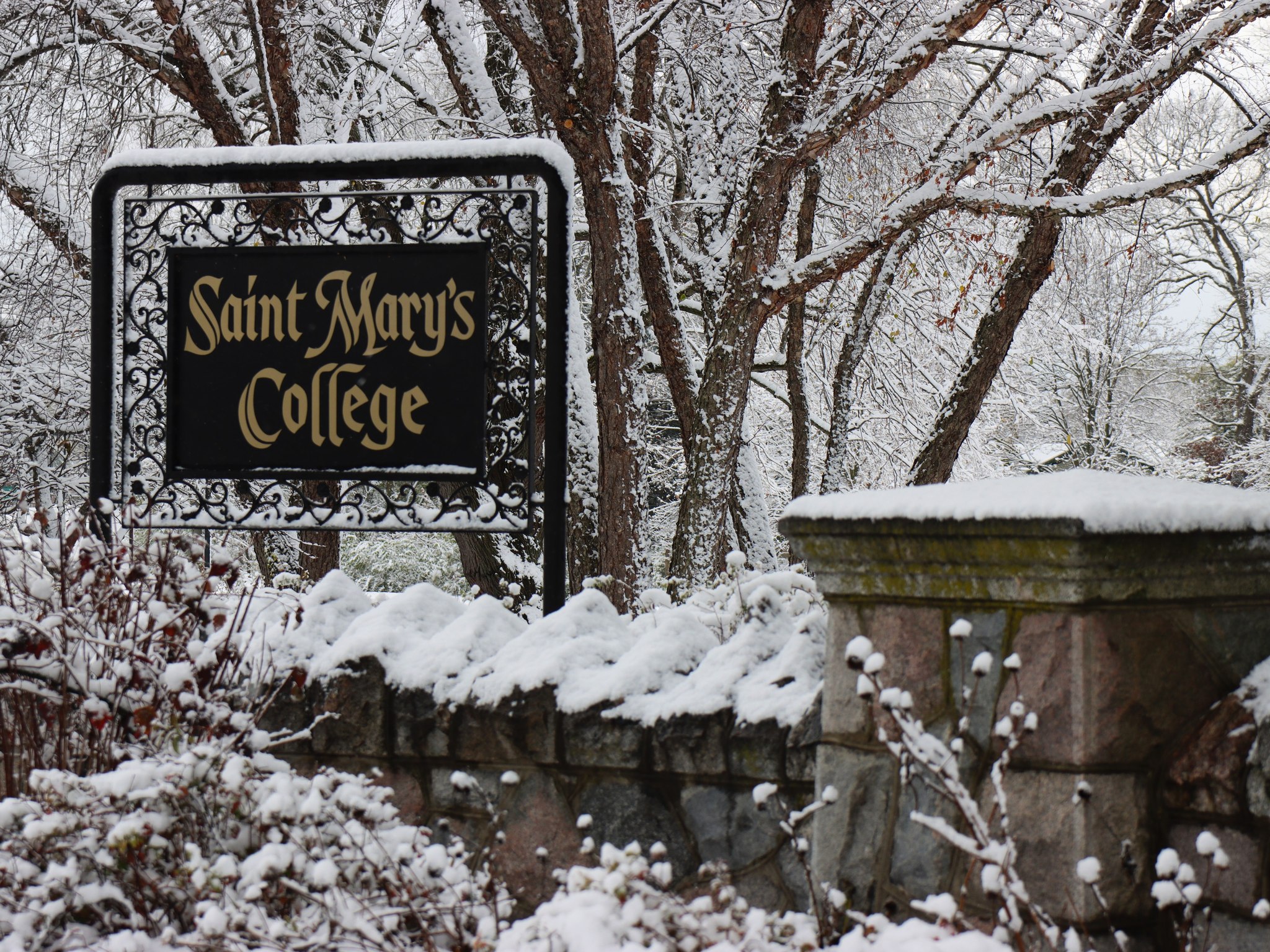
NOTRE DAME, Ind. – A non-discrimination trans-inclusive admissions policy at a Catholic women’s college, for undergraduate applicants “whose sex is female or who consistently live and identify as women” was reversed this week.
The Saint Mary’s College in Notre Dame student newspaper, The Observer, had reported the Board of Trustees had approved the change on June 23, and in “an email sent to faculty, staff and students Tuesday evening, President Katie Conboy said the College is still determining the practices that will follow from the policy. Admissions will begin considering transgender applicants in fall 2024.”
Following the release of the email, conservatives including students, some faculty, donors and Bishop Kevin C. Rhoades of the Fort Wayne-South Bend Diocese reacted negatively.
WSBT-TV South Bend, affiliated with CBS and Fox noted that Bishop Rhoades of the Fort Wayne-South Bend Diocese says he wasn’t consulted on the change in admission policy.
“It is disappointing that I, as bishop of the diocese in which Saint Mary’s College is located, was not included or consulted on a matter of important Catholic teaching,” Rhoades told WSBT. He also urged the school to reconsider the admission of undergraduate applicants who are trans females.
On Thursday, Dec. 21, the Saint Mary’s College Board of Trustees reversed their decision, and in a letter to Bishop Rhoades, students, faculty and donors noted:
Dear Saint Mary’s College Community,
Earlier this week, the Saint Mary’s College Board of Trustees met to discuss the impact of our recent decision to update our non-discrimination policy. The Board reflected on the sense of division we have experienced in our campus community and among our extended alumnae family since this decision was communicated. This has weighed heavily on our minds and in our hearts. There have been many voices responding to us from many places and perspectives. We have listened closely, and we have heard each of you.
When the Board approved this update, we viewed it as a reflection of our College’s commitment to live our Catholic values as a loving and just community. We believed it affirmed our identity as an inclusive, Catholic, women’s college. It is increasingly clear, however, that the position we took is not shared by all members of our community. Some worried that this was much more than a policy decision: they felt it was a dilution of our mission or even a threat to our Catholic identity. Moreover, we clearly underestimated our community’s genuine desire to be engaged in the process of shaping a policy of such significance. As this last month unfolded, we lost people’s trust and unintentionally created division where we had hoped for unity. For this, we are deeply sorry.
Taking all these factors into consideration, the Board has decided that we will return to our previous admission policy.
Although this has been a challenging time for our community, we believe that the College should continually grapple with the complexity of living our Catholic values in a changing world. But we also believe the College needs to do so as a community. When we disagree, we must strive to preserve the fabric of our relationships. This, at its core, is what it means to be a part of a vibrant Catholic campus in this moment. Whatever our differences, each of us has chosen Saint Mary’s. Our only future is a shared future where we accompany one another—and where we engage across differences with less certitude and more humility. This is the future we are working toward.
And this future is profoundly informed by our journey toward equity, inclusion, and justice. The Board and Administration are firmly committed to ensuring a welcoming and safe environment for all. To this end, beginning in January, we will introduce a series of listening sessions—both on campus and online for our extended family—to explore what it means to embrace our values as a Catholic, women’s college. We will continue to work toward understanding how a college like ours can become a true home, a place of open doors and open arms, where everyone, with all their differences intact, belongs.
We recognize that the experience of the last several weeks has been not only trying but also personally painful—for many reasons—for students, faculty, staff, and alumnae. Our deepest hope is for everyone to return in January committed to rebuilding trust and to building a campus that accepts healthy disagreement as part of the value of an academic community. For all colleges and universities, this is a defining challenge of our time.
In closing, in this season of the solstice—of darkness and of longing for the Light of the World—we might remember the persistence of the Magi. They set out, uncertain about their destination or the meaning of their journey. They followed a star to Bethlehem and discovered their purpose. And when they went home, they were changed. They understood that they could not simply return by an old road. They had to find a new way forward, a way that would transform the meaning of their return.
As we anticipate our own return, let us also continue to move forward—together—on our journey to be a community that is Gospel inspired, common good oriented, and dignity affirmative.
The letter was signed by Saint Mary President Katie Conboy and Board of Trustees Chair Maureen Karantz Smith.
Many that WSBT 22 spoke with say they are happy to see the decision reversed.
One alumni says that when she heard the initial policy change she stopped sending money to the school and will not support them financially until she knows the policy reversal is final.
Indiana
Indiana governor signs law, will out trans students to parents
“Indiana legislators have had one goal all along, to use our laws to control what youth can and cannot read, what they can and cannot learn”

INDIANAPOLIS – Republican Governor Eric Holcomb signed House Bill 1608 into law on Thursday, legislation that would ban conversation about LGBTQ+ families in schools and outs transgender students to their parents.
HB 1608 bans conversation about “human sexuality,” an undefined term and would broadly censor discussions about sexual orientation and gender identity in pre-K through third grade.
HB 1608 would also force teachers to out students who request to be referred to by a different name or pronoun, by sending a note home to parents. Studies show that youth who are transgender face a real risk of rejection by the adults who are supposed to care for them when they disclose their gender identity.
Last month, the governor signed Senate Bill 480, a bill banning gender-affirming care for trans minors that would also require young people already receiving such care to detransition. The American Civil Liberties Union and the ACLU of Indiana announced that they filed a lawsuit challenging the law.
In a statement, Katie Blair, ACLU of Indiana advocacy and public policy director issued said:
“The Indiana legislators behind HB 1608, and the Slate of Hate, have had one goal all along, to use our laws to control what youth can and cannot read, what they can and cannot learn, and—most troublingly— who they can and cannot be.
“Not every child can be their true selves at home without risking their physical or emotional well-being. For trans youth, especially those who cannot be safe at home, school may be one of the few places to be themselves. Trans youth thrive when they are affirmed in their gender identity, which includes being called by a name and pronouns that reflect who they are.
LGBTQ students exist at all ages and in all grade levels and their stories belong in Indiana schools. Our schools should protect all students—including LGBTQ students—so they can learn and thrive in a safe environment. ACLU of Indiana attorneys are assessing this law and will do everything in our power to protect the rights of LGBTQ students.”
Sarah Warbelow, the Human Rights Campaign Legal Director said:
“Governor Holcomb’s decision to sign this bill into law is a blatant attack on the well being of LGBTQ+ youth . Radical politicians are choosing to neglect the well-researched consensus of the American medical establishment, which confirms that ‘conversion therapy’ is dangerous and abusive. Allowing ‘conversion therapy’ to continue in Indiana will have devastating effects on vulnerable members of our community, and we will not stand idly by while the state of Indiana tells LGBTQ+ people that their lives and well-being are not worth protecting.”
Indiana
Indiana’s ‘Don’t Say Gay’ & outing trans kids bill heads to governor
The bill is one of six anti-LGBTQ+ measures being considered including anti-LGBTQ book & essential medical care for trans youth bans
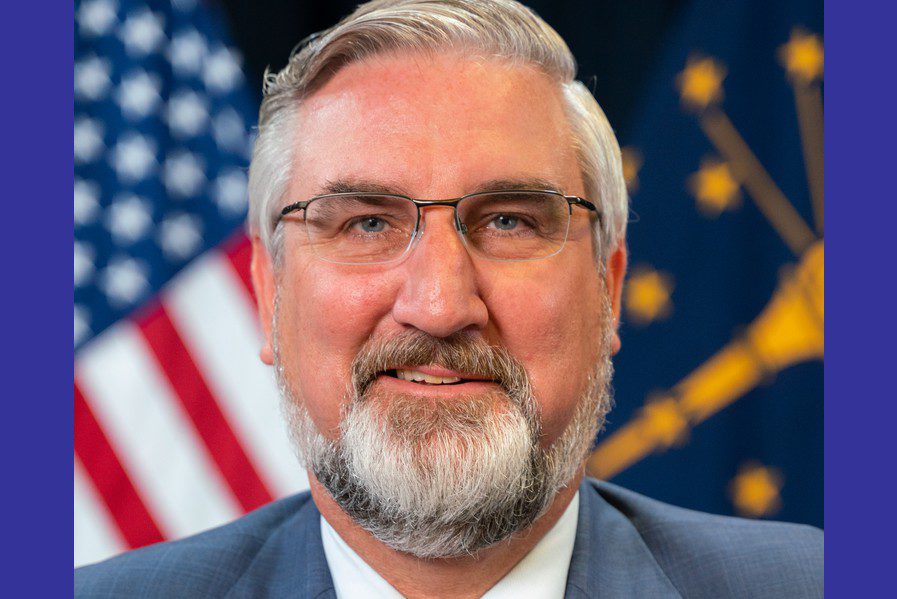
INDIANAPOLIS – Legislation that would effectively ban discussion or acknowledgement of LGBTQ+ people in classrooms under the guise of banning conversations around “human sexuality,” is on its way to Republican Governor Eric J. Holcomb‘s desk.
HB 1608 effectively bans any mention of LGBTQ people in grades PreK-3. The bill would also require teachers to out trans gender or queer students who request to be referred to by a different name or pronoun, by sending a note home to parents.
The bill is one of six anti-LGBTQ+ measures being considered by Indiana lawmakers, which include:
SB 480 bans essential medical care for trans youth.
SB 12 censors books in schools, opening librarians and teachers up to felony prosecution. These bills have historically been used to ban books related to LGBTQ topics.
HB 1569 denies access to gender-affirming care for people housed in the Department of Corrections.
HB 1407 makes it illegal for child services to consider failure to provide a safe and affirming environment to a trans youth when looking into abusive home environments.
Indiana
Indiana Court upheld decision removing trans teen from parents
The ruling clarifies that the parents’ freedom of speech/religious beliefs do not trump the child’s medical and/or psychological needs

INDIANAPOLIS – The Indiana Court of Appeals has upheld a lower court’s decision to remove a transgender child from the parents’ custody due to allegations of abuse and their refusal to support the teen’s gender identity.
This past Friday, the Court of Appeals published a 28-page ruling in the case of: In the Matter of A.C. (Minor Child), Child in Need of Services, and M.C. (Mother) and J.C. (Father) v. Indiana Department of Child Services, which clarifies that the parents’ freedom of speech/religious beliefs do not trump the child’s medical and/or psychological needs.
The mother and father claimed their status as “christians,” free speech and religious rights, were infringed upon when the lower court intervened.
The Indiana Lawyer reported the case started in May 2021, when the Department of Child Services received a report alleging that mother M.C. was verbally and emotionally abusing her 16-year-old child, A.C., by using rude and demeaning language regarding the teen’s transgender identity. As a result, A.C. had thoughts of self-harm.
A second report was filed and a week after the second report, DCS filed a proposed child in need of services petition in the Madison Circuit Court, alleging A.C. was a CHINS on two bases: A.C.’s physical or mental condition was seriously impaired or seriously endangered due to the parents’ neglect and/or A.C.’s physical or mental health was seriously endangered due to injury by the parents’ acts or omissions.
Following a hearing, the court issued an initial/detention order finding that it was in A.C.’s best interest to be removed from the home due to the parents’ “inability, refusal or neglect to provide shelter, care, and/or supervision at the present time.”
Later during the court process, The Indiana Lawyer reported:
At the close of a subsequent dispositional hearing, the court informed the parties that it would leave in place its earlier order prohibiting the parents from discussing the child’s transgender identity during visitation, but confirmed that it could be discussed at family therapy and that the court would reconsider the order when it could be safely discussed outside of therapy.
The trial court entered its dispositional order in which it found A.C. needed services and therapy, in which the parents were ordered to participate. The court also ordered that A.C. would remain in the current home or placement with DCS supervision.
On appeal, the parents argued the dispositional order and the trial court’s prior order on the combined initial and detention hearing were clearly erroneous. They also argued both orders violated their constitutional rights to the care, custody and control of A.C., the free exercise of religion and freedom of speech.
Indiana
South Bend Indiana Rainbow Story Hour disrupted by Proud Boys
Seven men — all Proud Boys — entered the library and began arguing with staff and patrons. Several displayed white supremacist symbols

SOUTH BEND, In. – A Pride Month children’s Rainbow Story Hour event at the St. Joseph County Public Library’s Virginia M. Tutt Branch on Monday was disrupted after the far-right anti-LGBTQ+ group, the Proud Boys, walked in and began loudly arguing with staff and library patrons.
At one point during the confrontation, one of the group unfurled a flag reading “Michiana Proud Boys,” appearing to identify the men as a local chapter of the white nationalist hate group.
This latest incident follows Proud Boys targeting LGBTQ+ Pride month events- especially Drag Queen Story Hour events- in Sparks Nevada, Wilmington North Carolina, Alameda California, Boise Idaho, many promulgated by highly influential far-right social media stars like Chaya Raichik, the Brooklyn real estate agent behind @LibsOfTikTok who has highlighted these events she calls out as inappropriate and sexualizing children to her more than 1.3 million followers on Twitter.
South Bend’s NPR outlet WVPE reported that the event was a partnership between the library and TREES, a Michiana organization that provides resources for the local transgender community and operates the Tree House Gender Resource center in downtown South Bend.
But before the event was set to start, seven men — all Proud Boys — entered the library and began arguing with staff and patrons. Several displayed white supremacist symbols, according to photos posted on social media.
Police were called — and the group left after about 40 minutes — but they caused so much disruption that the event had to be canceled.
“This definitely came as a shock,” library system communications manager Marissa Gebhard told WVPE. “We were not anticipating any problems.”
The library plans to reschedule the event in a few months, and Gebhard said the system wants everyone to feel safe and welcome at its branches.
The Proud Boys recognized one person because Purple for Parents (a local hate group focused on schools) had doxxed her before.
— Indiana Mutual Aid Coalition (@INMutualAid) June 28, 2022
This disruption is extremely concerning because it seems to be a part of coordinated disruptions of similar events across the country. 2/4 pic.twitter.com/QumqYn4Bxd
-

 LGBTQ+ RESOURCES4 days ago
LGBTQ+ RESOURCES4 days agoHope on the other side: How Rainbow Railroad rescues LGBTQI+ people at risk around the world
-

 Movies3 days ago
Movies3 days agoIntensive ‘Riefenstahl’ doc dives deep into a life of denial
-

 Features1 day ago
Features1 day agoHarnessing identity: Mr. CMEN Leather 2025 bares his heart and soul
-

 Books3 days ago
Books3 days agoThese four intertwined stories will leave you flabbergasted
-

 Events22 hours ago
Events22 hours ago“We are glimmers of hope”: LGBTQ+ advocates deliver powerful speeches defending queer rights at Equality Awards
-

 Miscellaneous1 day ago
Miscellaneous1 day agoTiffany ‘New York’ Pollard Dishes on queer storytelling in her new show ‘Slayers: Wheel of Fate’
-

 National4 hours ago
National4 hours agoLGBTQ rights on the line: What to watch as Supreme Court’s new term begins
-

 Events2 hours ago
Events2 hours agoThe Los Angeles Blade Partners with AJSOCAL to host gala uplifting AAPI joy and resistance



